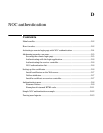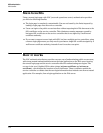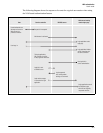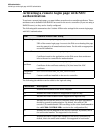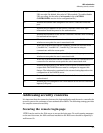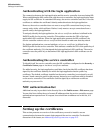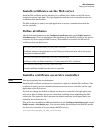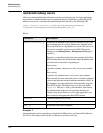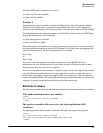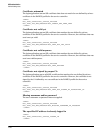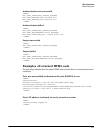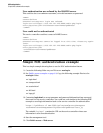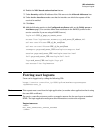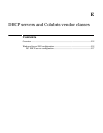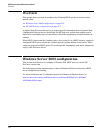
NOC authentication
Authenticating users
The Host HTTP header should be set to one of:
Host: www.noc-cn3.com:8090
Host: 192.168.4.2:8090
Example 2
Assume that the service controller is behind a NATting device. The device has the address
192.168.30.173, and the service controller has the address 192.168.4.2. A NAT mapping is
defined on the NATting device that redirects traffic received on port 8090 to 192.168.4.2:8090.
The login application must send its requests to 192.168.30.173, which results in a HTTP Host
header that contains one of the following:
Host: natting.device.com:8090
Host: 192.168.30.173:8090
When this request is forwarded to the service controller, it is rejected. To solve the problem,
the login application must forge the host HTTP header. This is easily done by plugging in the
values returned by the %i, %a, and %p placeholders. For example:
Host: %i:%p
or
Host: %a,%p
The service controller sends the username and password to the RADIUS server to
authenticate the user. If authentication is successful, the user’s IP address is used to grant
wireless network access to the user’s computer.
The service controller returns a positive or negative answer for the user login, along with the
relevant URLs that may be needed by the login application in order to redirect the user to
either a Welcome page or a Login error page located on the Web server. This information is
returned as standard HTML. The login application must parse this information to retrieve the
response. All possible responses are described in the following section.
Returned values
The following examples show the information returned for various authentication conditions.
NOC authentication mode is not enabled
<HTML>
NOC_INFO_STATUS=NOC_STATUS_DISABLED
</HTML>
The service controller did not receive the login application’s SSL
certificate
The login application did not send its certificate. Therefore, the request was rejected.
<HTML>
NOC_INFO_STATUS=NOC_STATUS_FAILURE
NOC_INFO_INT_ERR_MESSAGE=NOC_CANNOT_GET_PEER_CERT
</HTML>
D-9



